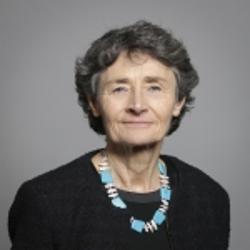
1 APPG Officer Position (as of 12 Jan 2026)
Acquired Brain Injury8 APPG Memberships
Care-Experienced Children and Young People, Creative Health, Further Education and Lifelong Learning, Media, Political and Media Literacy, Schools, Learning and Assessment, University, Sepsis5 Former APPG Officer Positions
Education Technology, Schools, Learning and Assessment, Social Mobility, T Levels, Teaching ProfessionDivision Voting information
Baroness Morris of Yardley voted Aye - against a party majority and in line with the House
One of 4 Labour Aye votes vs 122 Labour No votes
Tally: Ayes - 145 Noes - 126
Baroness Morris of Yardley voted Aye - against a party majority and in line with the House
One of 8 Labour Aye votes vs 120 Labour No votes
Tally: Ayes - 272 Noes - 125
Baroness Morris of Yardley voted Aye - against a party majority and in line with the House
One of 18 Labour Aye votes vs 114 Labour No votes
Tally: Ayes - 289 Noes - 118
Baroness Morris of Yardley voted Aye - against a party majority and in line with the House
One of 7 Labour Aye votes vs 110 Labour No votes
Tally: Ayes - 242 Noes - 116
Debates during the 2024 Parliament
Speeches made during Parliamentary debates are recorded in Hansard. For ease of browsing we have grouped debates into individual, departmental and legislative categories.
Sparring Partners
Minister of State (Department for Work and Pensions)
(6 debate interactions)
(2 debate interactions)
Department Debates
(10 debate contributions)
(9 debate contributions)
(3 debate contributions)
(2 debate contributions)
Legislation Debates
Baroness Morris of Yardley has not made any spoken contributions to legislative debateLords initiatives
These initiatives were driven by Baroness Morris of Yardley, and are more likely to reflect personal policy preferences.
Baroness Morris of Yardley has not introduced any legislation before Parliament
Baroness Morris of Yardley has not co-sponsored any Bills in the current parliamentary sitting
Latest 4 Written Questions
(View all written questions)1 Other Department Questions
The Department of Education is working with the Department of Work and Pensions to respond to the report as soon as possible. Both departments have been working hard on the Government’s response to the Public Services Committee’s report, but due to several factors, including policy developments announced since the report’s publication, the response has been delayed to ensure it reflects the Government’s latest position. The Departments aim to formally respond to the Committee report by the end of May and will keep the Committee updated in the usual way.
Leader of the House of Lords and Lord Privy Seal
3 Department of Health and Social Care Questions
(View all Baroness Morris of Yardley's DHSC questions)The current Department’s High Level Risk Register categorises the risk to the continuity of medicine supply as amber-red after consideration of the mitigations available. This assessment is continuously reviewed in light of changing external risks to the supply of medicines and actions are taken to further reduce the risk of medicine shortages.
When medicine supply issues occur, we have established processes and systems in place to limit the impact on patients. This has been set out in detail in our recent publications Managing a robust and resilient supply of medicines and A guide to the systems and processes for managing medicines supply issues in England.
Parliamentary Under-Secretary (Department of Health and Social Care)
The European Union’s Falsified Medicines Directive’s (FMD) primary purpose was to help prevent falsified medicines from entering the legal supply chain through the introduction of safety features on the packaging and verification at certain points of the supply chain to confirm authenticity. The monitoring and management of shortages was not part of its original legal framework.
There are provisions in the Medicines and Medical Devices Act 2021 providing powers to enable the introduction of a similar system to the EU’s FMD’s ‘safety features’ and verification in the United Kingdom. However, the powers allow us to go beyond the FMD and use derived data from any system for other health related purposes. For example, to support the recall of medicines, to support patient care, research, policy development, and medicine supply, to prevent diversion and support patient access to medicines, and to counter fraud in primary care. Regulations would be needed to set out the details of any scheme, which would require consultation. Consideration is being given as to whether to consult on options for a potential UK system. Any consultation would be published in the usual way on the GOV.UK website.
Parliamentary Under-Secretary (Department of Health and Social Care)
During the process to renew what is now the current framework agreement, Wigs and Accessories, NHS Supply Chain conducted extensive engagement nationally to fully understand the provision and supply of wigs, and the requirements from both a National Health Service and supplier perspective. A significant challenge was that wig provision is predominantly conducted by the health and beauty industry, who were not familiar with public procurement law and healthcare framework tendering. NHS Supply Chain’s clinical and commercial teams worked closely with these industry groups to support their access to the wigs framework, to provide a wider range of products for NHS providers to access.
The current NHS Supply Chain framework will expire toward the end of 2025 and NHS Supply Chain’s teams are engaging with key stakeholders across the NHS to determine the future approach in this product area, with appropriateness for the wearer as one of the fundamental focus areas of consideration.
Parliamentary Under-Secretary (Department of Health and Social Care)